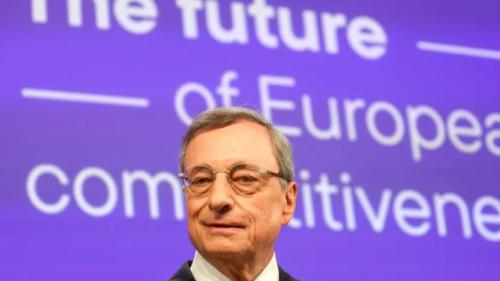
The actions of the new Trump administration will have a major impact beyond America’s borders, not least in Europe. Nevertheless, Europe should stop mourning the Democrats’ loss and do what it must do, whatever Trump’s intentions. Money is not the most pressing issue on Europe’s priority list, so Mario Draghi very correctly argues.
Hallmark: unpredictable
Last week the American people decided with a surprisingly comfortable majority that their 45th president should also be their 47th one. The re-election of Donald Trump will have major repercussions, for the United States as well as for the rest of the world. The detail of these repercussions will be dependent on the specifics of Trump’s actions once he re-enters the White House. The rather unpredictable variability in decision making looks set to continue, a hallmark of Donald Trump’s management style. For example, his first post-election statements and interventions on Ukraine were more sympathetic to Kyiv’s case than his campaign ramblings on the conflict were. Expect many more of these twists and turns.
Stop complaining
For the European Union and its member states, the new Trump term will undoubtedly bring tumult. But complaining about, or even mourning, the democratic choice of the American people, a preoccupation for so many European policymakers, certainly in EU circles, is wrong. Instead, the focus should be on how to deal pro-actively and efficiently with the challenges that will emanate from the second Trump administration.
A first point to note is that challenges attributed to the resurfacing of Trump as president are not new challenges at all. Let me focus on the most pressing challenges, i.e. the economic and security ones.
Umbrella
As far as Europe’s security is concerned, Trump’s attitude towards NATO will be the crucial issue. Trump has been adamant that European NATO members should drastically increase their contribution to the Western defense outlays. As a matter of fact, all American presidents of, say, the last three decades made the same claim. Most of them, it should be acknowledged, articulated this claim in words somewhat more attuned to European sensitivities than Donald Trump tends to do. The simple reality remains that Trump and his predecessors have a strong case for their claim. The United States spent $ 916 billion on defense in 2023, the EU member states en masse accounted for not even one third of that number. That Europe has been and still is sheltering under the American military umbrella is a huge understatement.
With Vladimir Putin’s invasion of Ukraine this European free-riding comfort zone in military affairs evaporated. It should be abundantly clear to all in Europe that the Russian president has broader ambitions and will not hesitate to widen his war in and against Ukraine. This includes an assault on Europe as a whole, by the means he deems appropriate and with the timing of his choice. Firm and decisive action grounded in defense capabilities of the European side is needed to discourage Putin from going this way. If we are truly serious about European norms and values and about the principles of social and economic progress, rule of law and political democracy, we have no option but to significantly strengthen our military capabilities and European defense capacity. This stands irrespective of the actions of Donald Trump.
On the economic front the broad lines of what president Trump will go for are also well known. We should though heed the warning that Trump in office might not be the same as Trump on the campaign trail. Stiff tariffs on imports are a near certainty. These will fall primarily against China, but Europe should not have too many illusions. A full-scale trade war will make everybody worse off, including the Americans (despite Trump’s rhetoric). The EU should try to deal carefully and intelligently with this Trumpian viewpoint. Other areas where Europe will need to watch carefully the actions (or lack of it) of the Trump administration are related to Big Tech (Amazon, Google, Apple, Microsoft, Nvidia, Meta, Tesla, …), the Federal Reserve (Fed) and cryptocurrencies.
The first reactions of the Big Tech CEOs to Trump’s victory spoke for themselves. They expect the critical approach of the Biden administration towards the monopolistic aspects of Big Tech’s behavior to be replaced by more leniency, not least because of the close relationship between Donald Trump and Elon Musk and wider Silicon Valley luminaries. As to the US central bank, the Fed, Trump has said on more than one occasion that he wants to have a say in monetary policy. That would be the end of the independence of the Fed. Altering this balance will have major implications for inflation, interest rates, the dollar and international financial stability. Trump was also explicit during his campaign on cryptocurrencies (wherein his family is financially engaged). Again, the more critical attitude of the Biden administration will most probably be replaced by a carte blanche-like approach. A Wild West for cryptocurrencies will result in substantial complications for overall financial stability. Trying to reinforce this threat to stability is the major reason why countries like Russia and North Korea are so active in the domain of cryptocurrencies.
Own house in order
The EU and its member states will have to watch closely where the Trump administration chooses to tread in all these and other domains. But the overriding imperative for the EU in this new episode of Trumpism is to put its own house in order, whatever Donald Trump does or not. At the start of the recent Budapest summit of European leaders, Mario Draghi, author of the by now already elaborately discussed eponymous report on Europe’s competitiveness, spoke a few crucial lines that all European leaders should heed. Money is not the most important thing, so Draghi argued. Most urgent is to “prevent the fragmentation of the single market and a fragmentation of capital markets”.
Money is not the most important thing
With this remark Draghi clearly reacted to the massive attention that one element from his report “The Future on European Competitiveness” has received in the weeks after its publication. Draghi estimated that something like 800 billion euros of extra investment are needed to restore and strengthen Europe’s competitiveness. Politicians of all stripes, but most outspokenly on the left side of the political spectrum, have largely reduced the Draghi report to the quest for that 800 billion euros. That conclusion is based on a serious misreading of the Draghi report. As Draghi emphasized in Budapest, money is not the most important thing. Throwing around 800 billion euros, predicated in the totally absurd hypothesis that this kind of money would be available any time soon, would not help Europe’s competitiveness, on the contrary.
Let me refer here to remarks made recently by Isabel Schnabel, member of the Executive Board of the European Central Bank (ECB). On October 2, Schnabel argued in a speech in Freiburg that “many reforms that can foster European competitiveness do not need significant upfront investments”. Furthermore, Schnabel continued, “would it be wrong to reduce the (Draghi) report to a call for more joint borrowing, which in any case should only be discussed after evaluating the experience with the Recovery and Resilience Facility”.
Politicians like to spend money
Both Mario Draghi and Isabel Schnabel lay out a truth that most European politicians do not like. Politicians like to spend money. What Europe needs now most of all is not money but courage to act and reform. Tax systems, labor market regulation, budgetary outlays schemes, investment frameworks and many other regulatory obstacles to productive and societally needed investment require a substantive overhaul. Most of these reforms don’t require further money. That certainly goes for Draghi’s explicit call to “prevent a fragmentation of the internal market and a fragmentation of the capital markets”. By focusing on “the 800 billion euros” of Mario Draghi we lose sight of what is really needed for Europe’s future. With or without Trump.
Usefull links & downloads
You may also be interested in

Exhausted we stand
The Western world is confronted by challenges the enormity of which has not been seen since the Second World War. We stagger to face these challenges in a state of policy exhaustion, budgetary as well as monetary. Only courageous and decisive reform can turn the tables in our favor.

A “neck breaking” exercise
Is the ECB arriving to a Catch 22 situation? Arguments favoring the recent rate cuts must be weighed against arguments going in the other direction. A still fragile inflation outlook and a front of maturing debt clouds the picture.